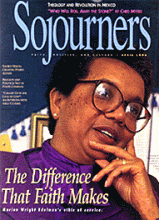Jim Wallis: You were once asked in an interview what was next for you"the Supreme Court? A Cabinet post?" You answered, "Of course not. I am doing what I think I was put on God's Earth to do. I wouldn't do anything else." I sense faith when you write and speak, that you can't speak of your work very long without some reference to the faith tradition that has shaped you.
Marian Wright Edelman: Yes. I grew up with people who lived their faith. My father was a preacher and a teacher who really committed himself to service. Both my parents, whenever they saw a need, really tried to respond. I guess I have tried to run my life in the same way.
There are just endless people in my life who live with such grace and such dignity and such sharing. That's the Christianity that I've grown up on. It allows people to get through life and get through the external things, never losing sight of what they thought was important. Sort of reminds you not to take Washington too seriously and not to take yourself too seriously.
Wallis: How does faith shape service, making it different from, for example, social service agencies that become too institutional and bureaucratic?
Edelman: You start with an ethic of service: You're there to empower others, you're the means not the ends, and service is a temporary response to crisis. Then you can enable people to live with dignity and have a capacity to struggle. So careerism or personal ambition really is not important.
That certainly has been a key, I'm convinced, of the success of Children's Defense Fund. For the first 15 years, we didn't know what a public relations person was. And we understood the way to get things done was to share and give to others and let them use and translate it.
Read the Full Article

